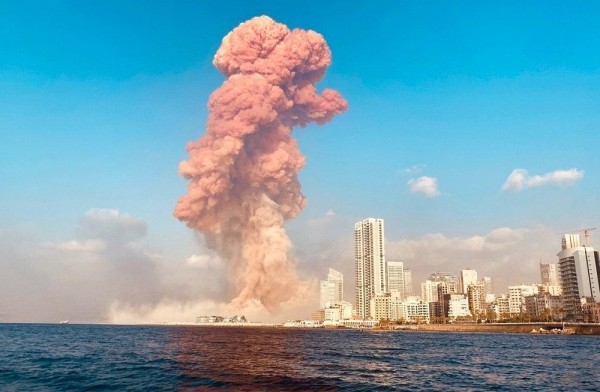

Amateur strategic arms control experts took to social media on Tuesday to proclaim that the massive explosion that rocked Beirut, Lebanon, closely resembled a nuclear blast.
At least 50 people were killed in the explosion and another 2,700 injured, according to Reuters, which cited Lebanon’s health minister. Photos posted on Twitter showed extensive damage to Beirut, especially the city’s economically vital port.
The main reason why some conspiracy-minded individuals are leaping to the conclusion that a nuke went off in Beirut is that explosion produced a classic mushroom cloud, which is familiar to anyone who as seen video or images of nuclear detonations.
One so-called website went as far as to claim that Israel had nuked a Hezbollah missile storage facility, but it admitted “our evaluation is guesswork” (an Israeli official told the BBC on condition of anonymity that “Israel has no connection” to the explosion in Beirut).
There are several things wrong with this theory. First, mushroom clouds are not unique to nuclear detonations. In fact, chemical explosions, such as the 2013 blast at a Texas fertilizer plant, can produce the same effect.
Second, experts do not believe Tuesday’s explosion was a nuclear detonation.
From outward appearances, Tuesday’s blast does not appear to have been caused by a nuclear device, said Hans Kristensen, director of the Nuclear Information Project at the Federation of American Scientists – someone who knows a thing or two about nuclear explosions.
“First, a nuclear explosion would be a lot more powerful and the cameraman would be gone,” Kristensen told Task & Purpose after viewing a video of the blast posted on Twitter. “Besides, I don’t see any bright radiation flash that you would get from a nuclear event. Having said that, it looks like a very powerful chemical or gas explosion.”
Ed Lyman, of the Union of Concerned Scientists, told Task & Purpose that he had not seen any elevated radiation levels or other indications that the explosion in Beirut was caused by a nuclear device –“and it would be hard to cover up,” he added.
“If this were a nuclear explosion there would be many other effects – high radiation levels being only one of them — that were not present,” Lyman said. “There would be reports of radiation injuries far from the blast site. But the initial explosion may have triggered a chemical explosion at the port, as the video suggests.”
In an eerie coincidence, Tuesday’s explosion comes just two days before the 75th anniversary of the U.S. military dropping the first atomic bomb on Hiroshima, Japan.
